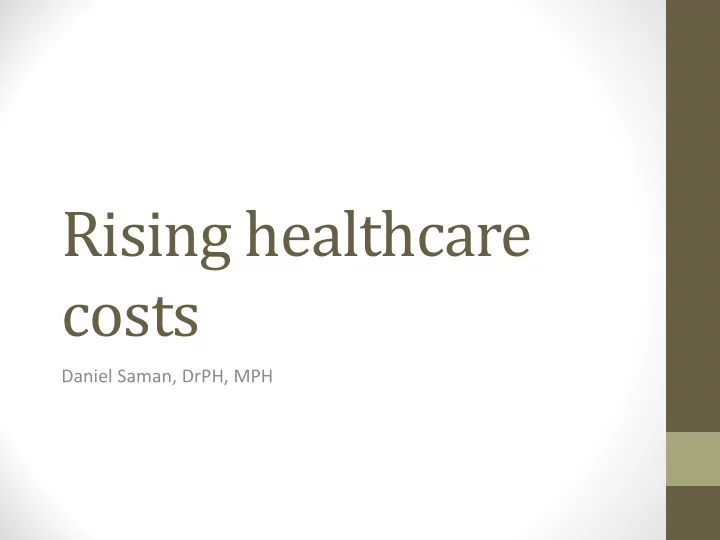

Rising healthcare costs Daniel Saman, DrPH, MPH
Questions • Difficult decisions for patients • Does more spending correlate to better care? • The ACA—how has it changed quality and costs. Who are the Losers and Winners? • Largest area of spending? • Insurance Companies + Big Pharma—understanding insurance costs and drug price spikes • Why are costs rising for patients?
Most important question • How much are you willing to pay?
Where we’re at with healthcare • Prices for medicine, doctor appointments and health insurance rose the most in August 2016 since 1984. • A recent report by Kaiser/HRET Employer Health Benefits forecasts that the average family health care plan will cost $18,142 , up 3.4% from 2015. That's faster than wage growth in America. • Premiums on the Obamacare exchanges are expected to rise by double- digits this year. • Overall, workers are paying up more for deductibles. Over half of U.S. workers with single coverage health insurance plans pay a deductible of $1,000 or more, up from 31% of workers in 2011. • Prescription drugs are most expensive in the U.S., with prices twice as high as in the U.K., Australia, and Canada.
Where we’re at with health
Where we’re at with health • U.S. spent an average of $9,086 per person annually. Life expectancy was 78.8 years. • Switzerland, the second-highest-spending country, spent $6,325 per person and had a life expectancy of 82.9 years. • Mortality rates for cancer were among the lowest in the U.S., but rates of chronic conditions, obesity, and infant mortality were higher than those abroad. • Why are prices here so much higher?
Answer • Administrative costs: Harvard economist David Cutler said that “ the administrative costs of running our healthcare system are astronomical. About one quarter of healthcare cost is associated with administration, which is far higher than in any other country.” • Drugs: In most countries the government negotiates drug prices with the drug makers, but when Congress created Medicare Part D, it specifically denied Medicare the right to use its power to negotiate drug prices. The Veteran's Administration and Medicaid, which can negotiate drug prices, pay the lowest drug prices. • Usage: When compared with other developed countries, for example, the U.S. uses three times as many mammograms , two- and-a-half times the number of MRIs and 31% more Caesarean sections.
Coming off the market • Lots of insurance companies taking plans off the market • Aetna will remove their marketplace plans stating they are losing money • Why?
Coming off the market • Aetna, which had 838,000 exchange customers at the end of June, said its policyholders are turning out to be sicker and costlier than expected. • "Providing affordable, high-quality health care options to consumers is not possible without a balanced risk pool," said Aetna CEO Mark Bertolini.
Healthcare ≠ improved health • Health care is not the main driver of health and longevity • Other factors such as genes, diet and exercise, accidents, violence, and harmful drug use are responsible for improved health • 18% of US GDP spent on healthcare. Sometimes worth it, though. Not all is waste, especially in cancer care • Slovakia spends $39 / capita on cancer care: avg. 5.5 yrs life expectancy after cancer diagnosis • Sweden spends $134 / capita on cancer care: avg. 9.9 yrs life expectancy after cancer diagnosis • US spends $207 per capita on cancer care: avg. 10.8 yrs life expectancy after cancer diagnosis Not due to ‘lead-time’ bias, 80% due to treatment once detected An Analysis of Whether Higher Health Care Spending in the United States Versus Europe Is ‘Worth It’ in the Case of Cancer.” Health Affairs 2012; 31(4): 667-675.
Price, not utilization • Price, not utilization, is the force behind historical m edical cost trend • Early 200s, price and utilization contributed to grow th in healthcare costs. Since then, use has declined and higher prices are driving grow th.
Spending (CMS Office of the Actuary)
Prices
Prices 2013 data from the International Federation of Health Plans
Prices • Canada's model. In Canada, the Patented Medicine Prices Review Board determines a maximum price for all drugs. The government is purchasing drugs similar to how the United States purchases medications for military personnel, but on a much wider scale. • Generic drugs in the U.S. are among the cheapest in the world • U.S. prescription-drug spending rises yearly, mainly due to increased prevalence of disease and intensity of treatment; only moderately due to price increases. Volume is key • Brandon Kramer and Michael Shally-Jensen. Prescription Drug costs. pp 273-283. in: Encyclopedia of Contemporary American Social Issues 4 volumes, ABC-CLIO, December 22, 2010, Social Science, 1707 pages, Santa Barbara
Answers • Does more spending correlate to better care? Sometimes, not always. Cancer care • The ACA—how has it changed quality and costs. Who are the Losers and Winners? The winners are high utilizers and insurance companies; premiums and deductibles up for everyone. Middle income who don’t have subsidies are losing • Largest area of spending? Hospital care • Insurance Companies + Big Pharma—understanding insurance costs and drug price spikes. Profit, intensity of treatment, prevalence of diseases • Why so expensive?? We’re generally less healthy, and we treat more aggressively and prices aren’t controlled
References • http://www.usatoday.com/story/news/politics/2016/08/16/aetna- changes-add-consumer-pain-regulator-pressure/88829392/ • http://www.heritage.org/research/reports/2014/03/the-impact-of- the-affordable-care-act-on-the-health-care-workforce • http://www.cnbc.com/2016/08/11/expect-your-health-insurance- costs-to-rise-in-2017.html • http://kff.org/health-costs/ • http://www.pwc.com/us/en/health-industries/health-research- institute/behind-the-numbers.html • http://www.forbes.com/sites/tomasphilipson/2014/12/05/are- europeans-spending-too-little-on-health-care-compared-to-the- us/#a9c405b5a098 • http://money.cnn.com/2016/08/15/news/economy/aetna- obamacare/
Recommend
More recommend